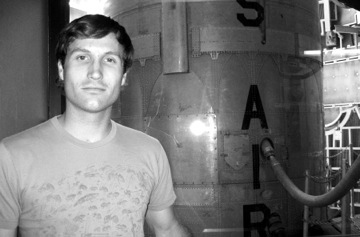
Stephen J. West
Sprints
Stephen J. West lives, writes, and teaches in Morgantown, West Virginia. He is also a columnist and creative nonfiction editor for THIS Literary Magazine.
The Drive from Morgantown to Baltimore
I walk out to the street with coffee in hand, climb into the car and turn the ignition. My wife quickly buckles her seatbelt and tunes the radio. It’s 5:33 am. We’re leaving three minutes late. As we make our way through the empty streets of Morgantown to the entrance ramp of 68 East, I think about how difficult it is to see in twilight, how each streetlamp is a stage prop spotlighting things we color with emotion. I think about the drive ahead, and the reason we have to make it.
We accelerate onto the highway and begin to carve our way across the rugged geography of Appalachia. No words pass between us. There’s no need; we’re accustomed to the drama of this landscape, to its weary mountains in various states of recovery, like the people who huddle among them. We speed through a collage of the backwater and ramshackle; of faded and tattered billboards bolted to rock outcroppings; of rusted automobiles and smoldering tires; of sagging gas stations and their announcements for cigarettes, beer, ammo, bait; of boarded windows that don’t necessarily connote abandonment, and so many other vignettes that remind us what people think when we tell them where we come from. Together, my wife and I can see past all of this to how we really feel: content as outliers, connected by what we divine in these dismissed expanses.
Today we’re driving with purpose, anxiously watching as the mountains slide toward sea level and dissolve into the industrial flats of the Eastern seaboard. We’re driving to the Wilmer Eye Institute in Baltimore because my wife has a detached retina in her left eye. This is her second detachment in as many years. The first occurred in her right eye, and a botched surgery left it with a field of vision that’s half daguerreotype, half darkness: a world in permanent twilight. Neuropathy. No explanation from her surgeon in West Virginia other than “bad things happen to good people.” My wife can still see with her left eye, and we’re driving today to find the best doctors we can, anyone at all that might offer more than cliché to help us believe it will always remain that way, to swaddle us and hush away the word that threatens to erode the world we share: blindness.
I’ve heard that scientists can grow human ears on mice and clone sheep named Dolly; I’ve read of stem cells, of the blind seeing again and other stories that systems of faith could use as proof for their beliefs. And I want to believe in all of them. I need to believe my wife will see. She’s only 29, and I’m only 29, and I want a life where we can look at each other. I want to share in the momentary reflections on mountain reservoirs and listen to her describe the density of chimney smoke spewing from hillside cabins; I want us to look warily at rusty trestle bridges on back roads and find relief in our eye contact when we reach the other side; I want to agree on the acquired taste of dilapidated red brick buildings and read the faded names painted on them aloud to each other, have her say they look like tattoos on an aging sailor; I want her to steal a glance at me and smirk when someone dismisses us because of where we live; and I need to reach out for her hand and always find it reaching for mine when, on the drive from Morgantown to Baltimore, we see the sun appear on the horizon and watch as it sets fire to the world where the continents once collided, where vision and emotion align, and know there’s no need to describe it with words.
“ I think truth in essay can materialize quickly, through glimpses, and doesn't necessarily resonate more when every nuance of a situation is dissected in writing. When that happens, the life presented on the page sometimes feels too handled to be sincere. And I didn't want the situation in this essay to feel handled. I wanted to give you just enough that you can touch the experience and let it touch you, for the briefest moment, sincerely, but never completely. ”
